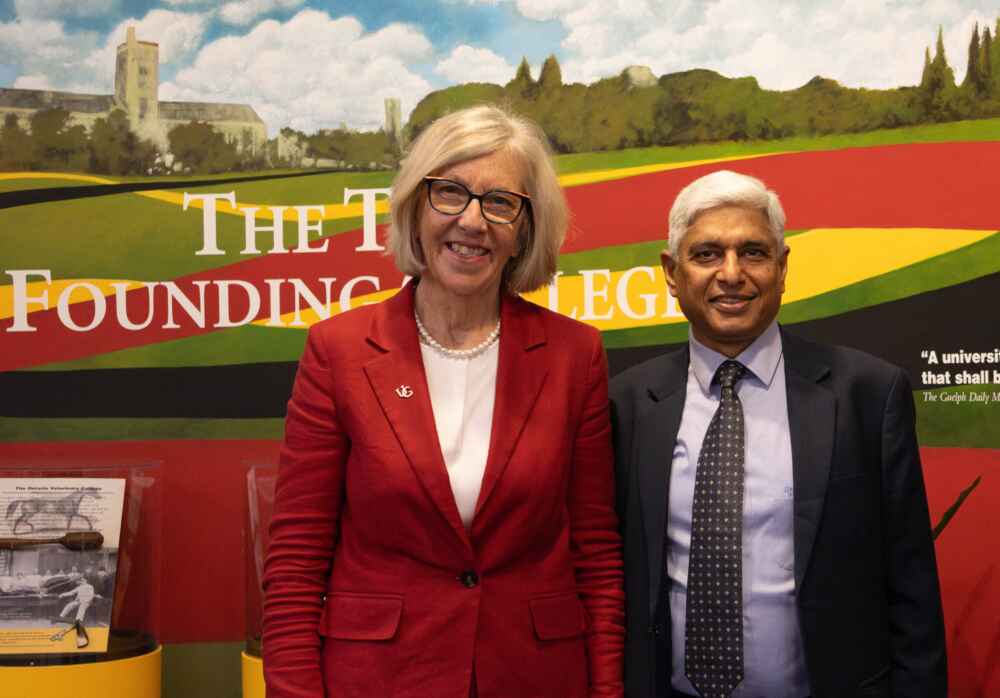With the aim of elevating and strengthening Canada-India relations through intellectual engagement, the University of Guelph and the Canada India Foundation have jointly launched a new Global Thought Leader in Residence at U of G.
The new initiative will deepen U of G’s existing connections with India by expanding Canada-India networks and increasing engagement with Indo-Canadian communities through knowledge exchange and collaboration.
With the goal of inspiring and mentoring students to become thought leaders, the initiative will annually host distinguished figures from India who have global appeal and reach, beginning with Vikas Swarup, a well-regarded author and former diplomat.
“It is our pleasure to welcome Mr. Swarup to the University of Guelph as our inaugural Global Thought Leader in Residence,” said U of G president Dr. Charlotte Yates.
“During his time as Indian High Commissioner to Canada, he became a great friend to the University – and he was awarded with an honorary degree in 2022. Mr. Swarup is also an award-winning author and wrote the novel upon which the film Slumdog Millionaire was based. He brings a wealth of expertise and thought leadership to our University, and his presence will help us further deeper the relationships we have with our Indian partners.”
Position to strengthen Canadian-Indian collaboration

Swarup will arrive on Sept. 13 and spend several weeks at U of G, contributing to strengthening the University’s relationship with India, engaging with University community members, providing guest lectures and participating in a public event open to the broader community.
U of G las long been committed to promoting Canada-India relations and is home to the Canada India Research Centre for Learning and Engagement (CIRCLE), which enables interdisciplinary research on India and the Indian diaspora as well as knowledge exchange between Canadian and Indian scholars.
CIRCLE’s inaugural director, Dr. Sharada Srinivasan, a professor in the Department of Sociology and Anthropology within the College of Social and Applied Human Sciences, is the faculty facilitator for this year’s residency.
“The presence of global thought leaders such as Vikas Swarup will inspire students, faculty and staff alike to deepen understanding of our interconnectedness and to become global citizens.” said Srinivsasan.
A strong supporter of CIRCLE, Swarup plans to use the position to strengthen Canadian-Indian collaboration.
“I’m honoured and delighted to be the first occupant of U of G’s Global Thought Leader in Residence program,” said Swarup. “I hope to use this residency to create greater awareness of the tremendous potential of the Canada-India relationship, catalyse fruitful partnerships between Indian institutions and U of G, get inspired by my interactions with the student community as well as work on a new book.”
U of G building on commitment to global engagement
The Canada India Foundation is a non-profit organization dedicated to promoting Canada–India relations, educating Canadians on India and increasing the participation by Indo-Canadians in the political process in Canada.
“The Canada India Foundation is very excited to partner with the University of Guelph in launching its first Global Thought Leader in Residence program,” said Canada India Foundation chair Satish Thakkar.
“We appreciate the fact that the first thought leader chosen is Vikas Swarup, an Indian who has excelled in several areas like international relations, diplomacy and creative writing. He will be a great voice to speak on the challenges and opportunities offered by the strengthening of Canada-India relationship to a younger and enthusiastic generation of Canadians.”
The new Global Thought Leader in Residence is one example of the way U of G is building on its commitment to global engagement.
In May, a new visiting chair in Indian studies was announced, which will bring eminent Indian scholars to campus to teach, conduct research and hold public lectures. The chair will strengthen ties to leading researchers and institutions in India and promote Indian culture and learning on campus.
These initiatives are part of a global engagement plan completed by the Office of International Strategies and Partnerships last year that places internationalization as a core priority within the University’s overall strategic plan.
